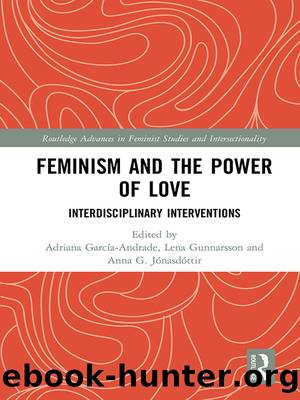Feminism and the Power of Love by unknow

Author:unknow
Language: eng
Format: epub
Tags: Nonfiction, Social & Cultural Studies, Social Science, Sociology
ISBN: 9781351780124
Publisher: Taylor and Francis
Published: 2018-04-17T04:00:00+00:00
Does affect theory account for not only how but why we should move âoutside the claims of nationalismâ?
The affective turn
Introducing the essays in The Affective Turn: Theorizing the Social, Patricia Clough describes the shift in socio-political critical theory toward studying affect as one where scholars across a range of disciplines have defined âaffectivity as a substrate of potential bodily responses, often autonomic responses, which are in excess of consciousnessâ (2007: 1â2). Put differently, Clough explains, affect theorists understand affect as the âpre-personal or pre-individual bodily capacity to affect and be affected or the augmentation or diminution of a bodyâs capacity to actâ (2007: 1).
Commentators have applauded this shift in focus, suggesting, for different reasons, that it brings much needed attention to the role of the emotions and feelings5 in human (and other animal) behavior, while broadening our understanding of that behavior to include the non-intentional, corporeal experience of material life processes (Bennett 2010; Berlant 2011; Brennan 2004; Connolly 2002; Massumi 2002; Sedgwick 2003).6 In particular, many have welcomed the renewed emphasis on the material or bodily experience of feelings (see Toyeâs review in this volume). Yet, others (Barnett 2008; Leys 2011) have raised concerns about affect theoristsâ understanding of affective responses as reactions occurring at the sub-personal, non-intentional, autonomic level of material existence. Shifting attention away from meaning in favor of a non-representational conceptualization of affect, in Barnettâs view, means that âthe critical account of affect makes it difficult to avoid a sense that politics is all about interventions that go on below the threshold of explicit articulationâ (2008: 195) and, without consent, becoming potentially a decidedly anti-democratic way to create an affinity for âworldly loveâ.
Does affect theory help us understand better the dynamics of attachment at work in love? In other words, does affect theoryâs ontological proposition that affect is about the bodyâs pre-conscious attunement and adjustment to its environment offer a sound theoretical foundation for developing an understanding of the energetics of love? What are the political implications of its ontological claims?
Affect theorists interested in politics have concentrated largely on classical activities and arenas of politics, such as the impact of media on shaping public opinion and voting behavior (Connolly 2002), or the design of urban public space (Thrift 2004). Most affect theories of politics have not sufficiently analyzed the gendered dynamics of love and power. Considering the implications of an application of affect theory to the analysis of gender-based violence might help demonstrate the stakes involved in adopting its approach to explain, and ultimately transform, the dynamics of intimate interactions.
Download
This site does not store any files on its server. We only index and link to content provided by other sites. Please contact the content providers to delete copyright contents if any and email us, we'll remove relevant links or contents immediately.
Rewire Your Anxious Brain by Catherine M. Pittman(17635)
Talking to Strangers by Malcolm Gladwell(11981)
The Art of Thinking Clearly by Rolf Dobelli(8923)
Mindhunter: Inside the FBI's Elite Serial Crime Unit by John E. Douglas & Mark Olshaker(7893)
Becoming Supernatural by Dr. Joe Dispenza(7158)
Change Your Questions, Change Your Life by Marilee Adams(6702)
The Road Less Traveled by M. Scott Peck(6685)
Nudge - Improving Decisions about Health, Wealth, and Happiness by Thaler Sunstein(6683)
The Lost Art of Listening by Michael P. Nichols(6526)
Enlightenment Now: The Case for Reason, Science, Humanism, and Progress by Steven Pinker(6446)
Win Bigly by Scott Adams(6356)
Mastermind: How to Think Like Sherlock Holmes by Maria Konnikova(6293)
The Way of Zen by Alan W. Watts(5843)
Daring Greatly by Brene Brown(5692)
Big Magic: Creative Living Beyond Fear by Elizabeth Gilbert(4779)
Grit by Angela Duckworth(4775)
Men In Love by Nancy Friday(4381)
Flow by Mihaly Csikszentmihalyi(4093)
The Four Tendencies by Gretchen Rubin(4057)
